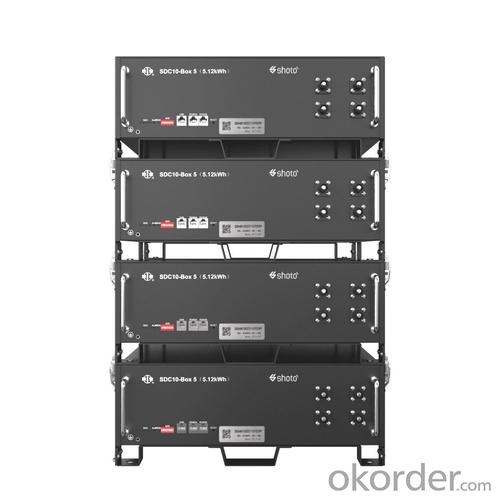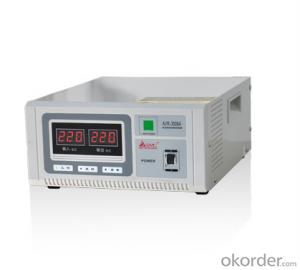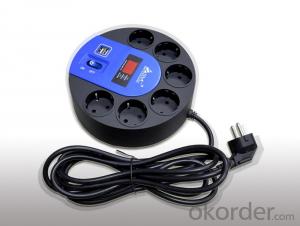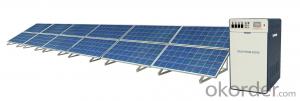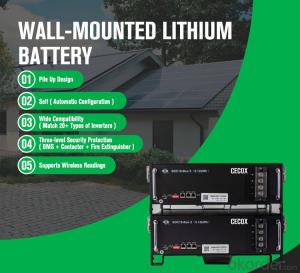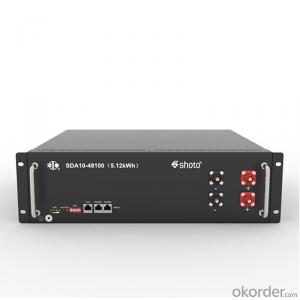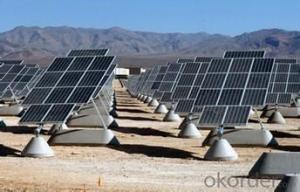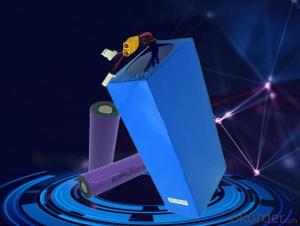Solar Energy Systems Skagit UL Certificate 5.12kwh Shoto 51.2V 100Ah 6000 Cycles @80% DOD 5 Years Warranty Lithium Battery
- Loading Port:
- SHANGHAI
- Payment Terms:
- TT OR LC
- Min Order Qty:
- 50 set
- Supply Capability:
- 5000 set/month
OKorder Service Pledge
Quality Product, Order Online Tracking, Timely Delivery
OKorder Financial Service
Credit Rating, Credit Services, Credit Purchasing
You Might Also Like
Specification
Application:
Home
Output Voltage (V):
51.2v
Introduction:
Solar energy preferably used by domestic appliances, and additional Energy is stored in battery.
During the day, when battery is fully charged, the additional energy produced by solar can be sold and fed into the public .
At evening, the energy stored in the battery supplies electriciity to the domestic appliances.
At night, when the energy stored in the battery is depleted, the public grid supplies energy to the domestic appliances.
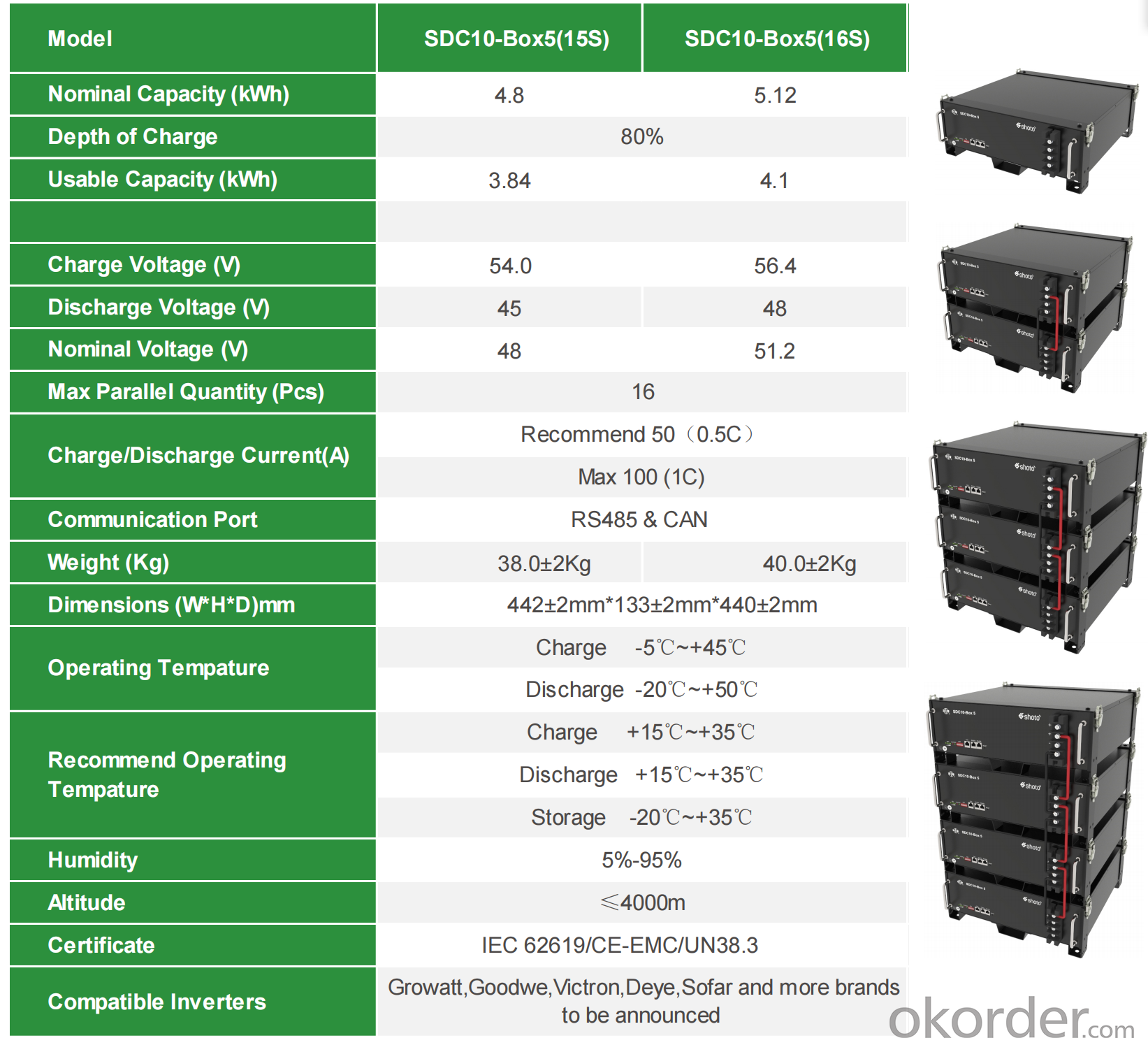
- Q: Can solar energy systems be used in areas with high levels of seismic activity?
- Yes, solar energy systems can be used in areas with high levels of seismic activity. These systems are designed to withstand various environmental conditions, including earthquakes. The mounting structures and panels are engineered to be flexible and durable, allowing them to withstand the vibrations and movements caused by seismic events. Additionally, solar energy systems do not have any moving parts, reducing the risk of damage during earthquakes.
- Q: What is the role of trackers in a solar energy system?
- Trackers play a crucial role in a solar energy system by optimizing the efficiency and output of solar panels. These devices are designed to track the movement of the sun throughout the day and adjust the position of the solar panels accordingly. By continuously orienting the panels towards the sun, trackers ensure that they receive maximum sunlight, resulting in increased energy production. The primary function of trackers is to maximize the solar energy captured by solar panels by maintaining their optimal angle relative to the sun. This is achieved through the use of sensors, motors, and control systems that enable the tracker to follow the sun's path from east to west. By continuously adjusting the panel's position, trackers can ensure that the sunlight hits the panels at a perpendicular angle, optimizing the amount of solar radiation absorbed. Trackers are particularly beneficial in locations with high variations in sunlight intensity throughout the day or across different seasons. By actively tracking the sun's movement, trackers can compensate for these variations and maintain a consistent level of solar energy production. This is especially important in regions with pronounced seasonal changes, as it allows solar panels to capture sunlight at the most effective angle year-round, maximizing their overall energy output. Furthermore, trackers can help improve the overall economics of a solar energy system. By increasing the efficiency of solar panels, trackers can generate more electricity from the same surface area. This means that fewer panels are required to produce a given amount of energy, reducing the overall cost of the system. Additionally, trackers can increase the return on investment by maximizing the energy output and reducing the payback period of the solar installation. In conclusion, the role of trackers in a solar energy system is to optimize the performance and efficiency of solar panels by continuously adjusting their position to face the sun. By maximizing the amount of sunlight captured, trackers enhance energy production, improve the economics of the system, and ensure a consistent level of solar energy generation throughout the day and across different seasons.
- Q: How does the efficiency of solar panels vary based on the manufacturer?
- The efficiency of solar panels can vary based on the manufacturer due to differences in the quality of materials used, the manufacturing processes employed, and the level of research and development invested by each manufacturer. Some manufacturers may have more advanced technologies and innovative designs, resulting in higher efficiency panels. Additionally, the reputation and experience of a manufacturer can also play a role in the efficiency of their solar panels, as established companies often have a track record of producing high-quality and efficient products.
- Q: Can a solar energy system be integrated with an existing electrical system?
- Yes, a solar energy system can be integrated with an existing electrical system. It involves installing solar panels, an inverter, and a net metering system that allows the solar-generated electricity to be used alongside the existing electrical grid. This integration can help reduce reliance on traditional grid power and provide clean, renewable energy for the building.
- Q: Can solar energy systems be used in areas with limited government support?
- Yes, solar energy systems can be used in areas with limited government support. In fact, solar energy can be a viable solution for regions with limited infrastructure and government services. Off-grid solar systems can provide electricity to remote areas where grid connectivity is not available or reliable. Additionally, the decreasing cost of solar panels and advancements in battery storage technologies make it more feasible for individuals and communities to adopt solar energy systems, even in areas with limited government support.
- Q: Can solar energy systems be used in all locations?
- Solar energy systems can be used in most locations, but their efficiency and effectiveness may vary depending on factors such as sunlight availability, climate, and geographical location.
- Q: Can solar energy systems be used in areas with high levels of air humidity?
- Yes, solar energy systems can be used in areas with high levels of air humidity. While high humidity can affect the efficiency of solar panels to some extent, it does not render them unusable. Solar panels can still generate electricity in such areas, although the output may be slightly lower compared to regions with lower humidity levels. Overall, solar energy systems remain a viable and effective option for power generation in humid environments.
- Q: Can solar energy systems be used for powering off-grid islands?
- Yes, solar energy systems can be used for powering off-grid islands. Solar panels can be installed on rooftops or open spaces to harness sunlight and convert it into electricity. This renewable energy source can provide a reliable and sustainable power supply for off-grid islands, reducing their dependence on fossil fuels and decreasing their carbon footprint. Additionally, advancements in battery storage technology allow excess solar energy to be stored and used during cloudy periods or at night, ensuring a continuous power supply.
- Q: How does the size of a solar energy system affect its performance?
- The size of a solar energy system directly affects its performance as it determines the amount of electricity it can generate. A larger system with more solar panels can produce a greater amount of energy, resulting in higher performance and increased ability to meet electricity needs. Conversely, a smaller system may not generate enough energy to fully power a home or business, leading to lower performance and potential reliance on other sources of electricity.
- Q: How do solar energy systems impact property values?
- Solar energy systems can have a positive impact on property values. Studies have shown that homes equipped with solar panels tend to sell at a higher price and quicker compared to homes without them. The potential energy cost savings, environmental benefits, and increased desirability of owning a renewable energy source all contribute to the increased value.
Send your message to us
Solar Energy Systems Skagit UL Certificate 5.12kwh Shoto 51.2V 100Ah 6000 Cycles @80% DOD 5 Years Warranty Lithium Battery
- Loading Port:
- SHANGHAI
- Payment Terms:
- TT OR LC
- Min Order Qty:
- 50 set
- Supply Capability:
- 5000 set/month
OKorder Service Pledge
Quality Product, Order Online Tracking, Timely Delivery
OKorder Financial Service
Credit Rating, Credit Services, Credit Purchasing
Similar products
Hot products
Hot Searches
Related keywords






